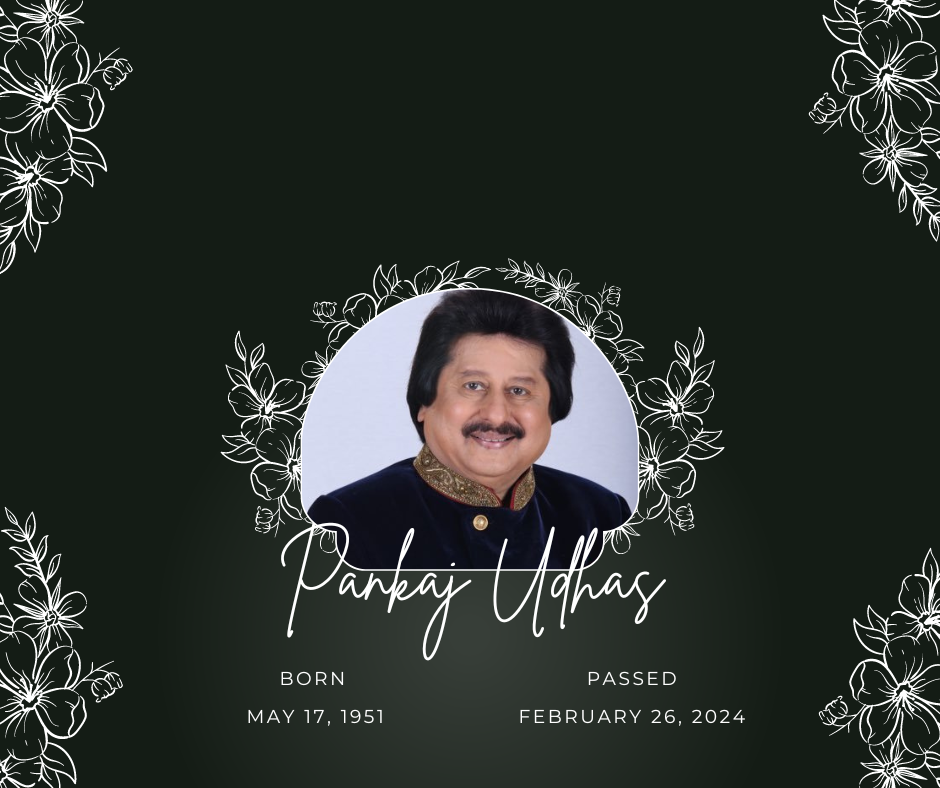


After a protracted illness, Pankaj Udhas passes dead at the age of 72. According to PM Modi, "his ghazals spoke to our souls."
Pankaj Udhas Dies: Pankaj Udhas passes dead at the age of 72 in Mumbai on Monday, February 26, following a protracted illness. “With a very heavy heart, we are saddened to inform you of the sad demise of Padma Shri Pankaj Udhas on 26th February 2024 due to a prolonged illness,” his daughter Nayyab wrote on social media to confirm the tragic news. Udhas household. On Tuesday, there will be his farewell ceremonies.
Indian playback and ghazal singer Pankaj Udhas (17 May 1951 – 26 February 2024) was well-known for his contributions to Indian pop and Hindi film. In 1980, the ghazal album Aahat marked the beginning of his career. He went on to record a number of songs, including Mukarar in 1981, Tarrannum in 1982, Mehfil in 1983, Pankaj Udhas Live at Royal Albert Hall in 1984, Nayaab in 1985, and Aafreen in 1986. Following his ghazal singing career, he received an invitation to sing in Mahesh Bhatt’s film Naam. Udhas gained more notoriety for his singing in the 1986 movie Naam, when his hit song “Chitthi Aayee Hai” (the letter has arrived) was released.
Table of Contents
ToggleAfter that, he performed playback vocals for other Hindi movies. He became a well-known singer thanks to albums and live performances all over the world. India’s fourth-highest civilian honor, the Padma Shri, was given to Pankaj Udhas in 2006.Manhar and Nirmal Udhas, his brothers, are also vocalists.
Awards
- 2006 – Pankaj Udhas Awarded Padmashree for his contribution to the art of ghazal singing his huge contribution to cancer patients and thallasemic children through his on the occasion of him completing 25 years of ghazal singing.
- 2006 – Awarded the prestigious “Kalakar” award at Kolkata for “Hasrat” as “Best Ghazal album of 2005”.
- 2004 – Special Felicitation at the Wembley Conference Center, London for Completing 20 Years of Performance at the Prestigious Venue.
- 2003 – MTV Immies Award for the successful album ‘In Search of Meer’.
- 2003 – Special Achievement Award at the Bollywood Music Award, New York for Popularizing Ghazals Across the Globe.
- 2003 – Dadabhai Naoroji Millennium Award conferred by the Dadabhai Naoroji International Society for Contribution to Ghazal and the Music Industry.
- 2002 – Award for Excellence in Music Field presented by Sahyog Foundation at Mumbai.
- 2002 – Honoured by the Indo-American Chamber of Commerce.
- 2001 – Vocational Recognition Award for Outstanding Performance as a Ghazal singer presented by Rotary Club of Mumbai Downtown.
- 1999 – Bharatiya Vidya Bhavan, USA Award for extraordinary services to Indian music, especially promotion of ghazals in India and abroad. Presented at the Festival of Ghazals held in New York.
- 1998 – Indian Arts Awards Gala presented by the Mayor of the City of Jersey City.
- 1998 – Outstanding Artistic Achievement Award presented by the American Academy of Artists at Atlantic City.
- 1996 – Indira Gandhi Priyadarshani Award for Outstanding Services, Achievement and Contribution to Music.
- 1994 – Honorary Citizenship of Lubbock Texas, USA.


Childhood
In the Gujarati village of Charakhadi, Jetpur, Pankaj Udhas was born. Out of the three brothers, he was the youngest. Keshubhai and Jituben Udhas were his parents. Manhar Udhas, his older brother, was a successful Hindi playback singer in Bollywood movies. Of the three brothers, his second oldest brother Nirmal Udhas began singing in the family and is also a well-known Ghazal singer. He attended Sir BPTI Bhavanagar to study. Pankaj attended St. Xavier’s College in Mumbai when his family relocated there.
Udhas’s family was zamindars, or traditional landlords, in the town of Charkhadi, which is close to Rajkot. His grandpa became the first person in the village to graduate and was appointed as the state’s revenue minister, or Diwan, in Bhavnagar. Keshubhai Udhas, his father, was employed by the government and learned how to play the dilruba from the famous veena player Abdul Karim Khan.Udhas’s father used to play the stringed instrument known as the dilruba when he was younger. His father enrolled him and his brothers in the Sangeet Academy in Rajkot after noticing their passion for music. After enrolling in a tabla lesson, Udhas later started studying Hindustani vocal classical music with Ghulam Qadir Khan Sahab.

Career
The song Chandi Jaisa Pankaj Udhas sang the song Rang hai tera, sone jaise bal, which means “Your color is like silver, your hair is like gold.” Manhar Udhas, Pankaj’s elder brother, was a theatrical performer and helped his younger brother get started in music. During the Sino-Indian War, he made his stage debut singing “Aye Mere Watan Ke Logo”; as a thank you, an audience member gave him Rs. 51.
After four years, he enrolled in Rajkot’s Sangeet Natya Academy to study the subtleties of tabla playing. Following that, he studied for a Bachelor of Science at Wilson College and St. Xavier’s College in Mumbai. Master Navrang was his teacher for Indian classical voice music. Although the movie “Kamna” was a commercial failure, Udhas’s debut song was a solo composed by Usha Khanna and written by Naqsh Lyallpuri. His performance was highly praised. Udhas then became interested in ghazals and studied Urdu in an attempt to become a ghazal singer. After performing at ghazal concerts for 10 months in the US and Canada, he returned to India with more energy and self-assurance.
In December 1987, Music India released his album Shagufta, which was the country’s first compact disk release.Subsequently, Udhas launched Aadab Aarz Hai, a talent hunt show on Sony Entertainment Television.John Abraham, an actor, refers to Udhas as his guru.Udhas’s ghazals discuss sharab, love, and inebriation.

